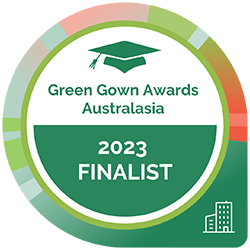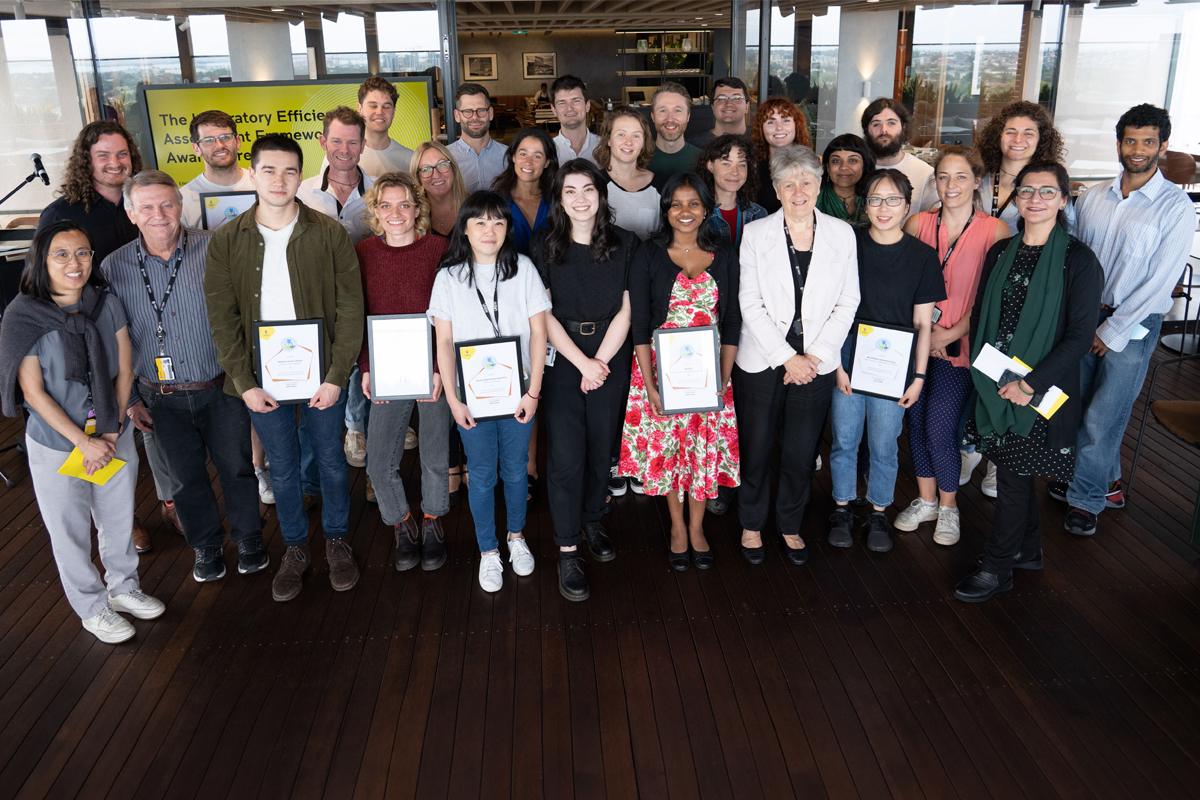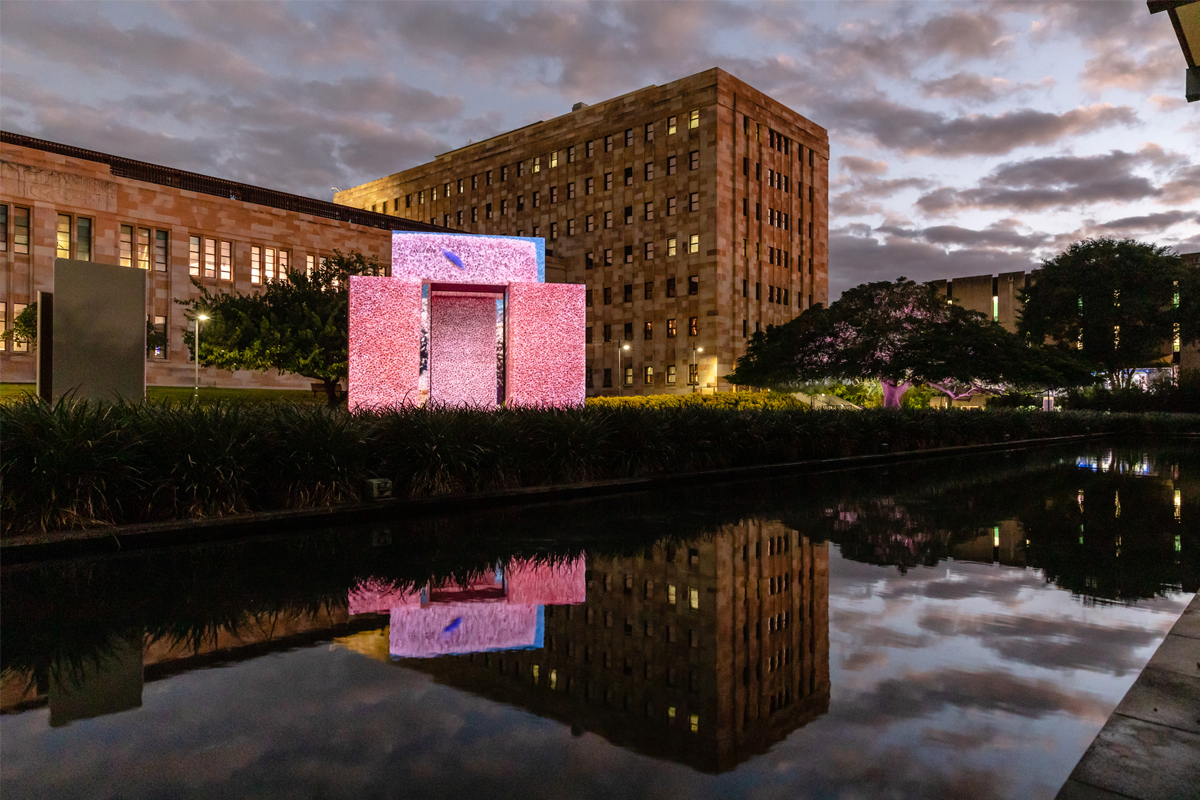Creating Impact category
The Sustainability Challenges are online, self-paced, action-based, co-curricular programs designed to both educate participants in major sustainability issues and to establish long-term behavioural change through small habit building. Since 2020, 435 students have completed the Challenges, which include roughly 5 hours of learning and 10 days to demonstrate, practice and consolidate their new sustainable habits. Each Challenge teaches participants about the UN SDG’s and sustainability issues, before breaking down bigger sustainability goals into bite-size habits they can easily adopt into their daily lives, using the habit formation psychology of Dr B.J. Fogg.
The Origin Story
The Challenges were developed with no additional funding or resourcing by a Global Leadership Program (GLP)* staff member during the COVID-19 lockdowns of 2020 in order to, at least initially, fulfil a need to create online opportunities for students. As the first Challenge came together, however, we realised the potential impact this type of learning could have due to these key characteristics:
- Free to participate
- Assessment free
- Easily scalable
- Unbound by curriculum/course limitations
- Use of a variety of media to engage Gen Z students
The Challenges
Two Challenges have been developed, one focussing on Waste and the other on Carbon Emissions. The Challenges take participants on a 5-step journey:
- Knowledge: Little base knowledge is assumed and participants are presented with information from a variety of both media types and information sources, all of which is open source and from trusted organisations such as the Climate Council, the ABC, and local NGO’s such as WornUp and OzHarvest. They offer basic explainers, case studies and even a personalised motivational message from staff-favourite Costa Georgiadis. “The content and resources supplied were easy to read and understand. The quiz questions and activities were also easy to understand, and were good as they made me think more deeply about how the content relates to my actions, and how I can implement the practical tips provided into my daily life.”
- Motivation: In order to complete the challenge, students must actively participate in either 4 or 5 challenges (depending on the focus of the challenge), see Table 1: The Challenge Design. “They were easy to understand and to be put into almost instant action which allowed for change almost simultaneously.”
- Small action: Doing a quick google search of “sustainable actions you can take today” can leave you totally overwhelmed with answers like “start composting!” or “use your local earn and return!”. But, how do you actually start a compost pile? How do you use earn and return? Our challenges intentionally breakdown these common “tips” into micro actions. Our first option is a “one time” action. Want to be composter? Start by finding a container in your kitchen to put scraps in. Want to use earn and return? Go to the website and check where the closest facility is, or download the earn and return app. These are examples of one time actions. For those more advanced students, their challenge may be to start putting their banana peels in their benchtop container everyday, or to put their recyclable containers in a box, ready for earn and return on the weekend. We call these “repeat” actions. Our final category are “boost” actions. This is where to take a sustainable habit you already have to the next level. A participant might show their flatmates how to use the benchtop compost container, or promote their use of earn and return on their Instagram account. “I liked how the program introduced me to things that I had never thought of previously and showed how by changing my own habits I can create a positive impact.”
- Celebration and community: The celebration of the completed action takes place in ‘Padlets’. Each individual challenge (see Table 1) within the modules has an interactive Padlet board, where students are asked to share their actions. This step is critical in generating a sense of community and shared achievement, while inspiring and informing their peers with their own ideas and actions. “I liked how there was a ‘community’ aspect of it, where we can see other students’ responses to prompts. It was nice being able to look at other people’s aims and targets because it helps with setting your own goals with sustainability.”
- Positive impact: Participants create new long-term habits with positive environmental and social benefits. “After completing the GLP Sustainability Challenge, I have worked on my current habits and acknowledged the importance of taking care of the environment, particularly at home.”
| Sustainability Challenge: Waste (SC-W) | Sustainability Challenge: Carbon (SC-C) |
| UN SDG introduction | UN SDG introduction |
| What’s the problem with waste? | What’s the problem with carbon emissions? |
| Circular economy | Carbon offsetting |
| Challenge 1: Waste avoidance | Challenge 1: Energy |
| Challenge 2: Food waste | Challenge 2: Transport |
| Challenge 3: Reuse | Challenge 3: Fashion |
| Challenge 4: E-waste | Challenge 4: Fashion |
| Challenge 5: Recycling | Final pledge |
| Final pledge |
* The Global Leadership Program (GLP) which is a free, co-curricular global citizenship education program open to all students at Macquarie University with approximately 3000 currently enrolled students. Students are motivated by a points system to participate in a variety of activities.

Environmental and social benefits
Environmental outcomes
The Challenges have, to date, informed 435 students about sustainability and have created lasting behavioural change through the adoption of small habits related to waste and carbon emissions. In a follow up survey of past participants 88% of respondents confirmed that, as a direct result of their participation in the Challenges, they have established new habits, including recycling; growing food; opting for online resources instead of textbooks; composting; ethical purchasing; shorter showers; renewable energy use; using reusable products; walking instead of driving; and eating less meat. The environmental impact is clear: our Challenges created sustained behaviour shifts in the lives of hundreds of students.
“I separate my soft plastics now and have bought way less plastic bags from the supermarket. I have a giant bag of both the cardboard and tote bags in the back of my car that I keep near the door and take to my car every time I go out. I’ve also made sure to only by produce out of plastic packaging when I’m able to. I’ve gotten a lot better at planning meals and not only that but using the leftovers in my fridge and freezer.”
“I finally recycled all my old electronics lying around my house at a recycling centre, I started a compost bin, I started recycling my cans and bottles and started my own vegetable garden which now has cherry tomatoes, kale, lettuce and herbs!”
Social outcomes
The social outcomes of the Challenges were carefully considered and are three-fold:
- The use of Padlets allowed students to engage with each others content/actions in order to build connection and comradery between participants (including staff!). “Was also great seeing comments from all the other students to feel we are all connected and working towards sustainability together!”
- 64% of participants have knowingly influenced or inspired others with their new habits or learnings, including family, friends, housemates and landlords.
- Participants have noted that, as result of the Challenge, they feel more confident discussing environmental issues and encouraging/convincing others to make environmentally conscious decisions.
“I encourage my close friends and family to recycle and often talk about ways they can reduce the use of heaters\AC bringing down their energy consumption. I also got my landlord to start doing the bottle deposit collection so those hard plastics can be properly recycled.”
“I began composting my whole family (who I live with) are joining in too! This has also been wonderful for our garden.”
Operational outcomes
Staff involvement in the challenge brought sustainability to the forefront of our programming and in 2023 resulted in the introduction of ‘social and environmental sustainability’ as one of four formal program values. This shift in program values reflects a long-term commitment to incorporating sustainability as a fundamental principle in all that we do.
Leadership and engagement
Prior to participating, students have reported feeling incapable of habit change and simultaneously daunted by the SDG targets. Icons of sustainability like Greta Thunberg or The Rogue Ginger are idealised, but their actions seem irreplicable in everyday life. What is distinct about our Challenges is that not only do they encourage the small wins, they celebrate them! This incorporation of behavioural psychology has allowed participants (students and staff) to feel lifestyle change is attainable. The Challenges also highly personalised to a participant’s own life and unique circumstances, allowing them to explore their own behaviours and choices in an assessment-free environment. We’ve been proud to achieve these through our highly scalable, highly accessible, replicable and low-cost model.
“I liked how … for every challenge it had what UN goals it contributed towards which was a good link and made it seem like I could achieve the goals individually.”
“(The challenge)… covered a good range of areas in which people can change and really made me think about the things I do on a daily basis that impact the environment, and I realised I was actually quite environmentally friendly when we often feel that we aren’t making a difference.”
“I feel like there was an abundance of information which was relevant to us as individuals at a university level in terms of what we can do to help reduce our waste which I really appreciated. The practical suggestions and answers given are extremely helpful and can be implemented at varying levels depending on capacity and ability of the individual.”
Significance to the sector
Our Challenges (from the research we’ve undertaken), appear to have a unique set of attributes that when combined together, makes them distinct to the higher education sector in Australia:
- They can be run in and out of regular academic timetabling
- There is no grading
- Participants come from a large variety of disciplines to share ideas
- Participants include undergraduate, postgraduate and study abroad and exchange students, both on and offshore
- They are replicable and scalable in any institution through an online learning platform
- They demonstrate the value of learning outside of a set discipline
- They combine knowledge gain and the application of the knowledge into action
- They are free of cost to participants!
Wider societal impact
The impact and value of our Challenges can be seen in tangible outcomes related to SDGs 12 and 13 with actual and ongoing reductions in both waste and carbon emissions by participants who truly believe in their own capacity to change. As previously mentioned, over 64% of participants believe they’ve changed the actions of others, demonstrating the butterfly effect we had hoped for.
Participant feedback demonstrates a belief in the impacts of individual actions and their ability, through modelling and advocacy, to affect change in a variety of contexts including their homes, social circles and workplaces.
“I really liked setting challenges for myself and seeing all the other great challenges that everyone else set by reading everyone’s posts on the Padlet. I also really liked using the ABC Carbon Counter to see just how much CO2 I would be saving by making small lifestyle changes, it was really motivating and helped put things into perspective.”
“I liked that the activities that they had us try weren’t too difficult to implement and continue in our daily lives.”
“I felt very moved after completing this unit, and I shared all this new knowledge with my friend group and bought reusable shopping bags for everyone. My partner and I also bought our own pack of travel cutleries that we use instead of using plastic forks and knives when we eat out. My friend, later on, decided to complete the GLP sustainability unit after hearing about my experience with it.”
Learner/Graduate employer impact
No matter the sector or industry in which a graduate seeks employment, a working knowledge of the UNSDGs and key sustainability issues such as carbon emission and waste is a potential opportunity for employers both domestically and abroad. Research has shown that having staff with foundational sustainability knowledge can have positive impacts on procurement practices, reduction in office waste, improved employee well-being and enhanced brand reputation, amongst other benefits. More broadly, the Challenges relate directly to our wider program outcomes of ethical reasoning, self-management and critical thinking, all of which are tested and strengthened throughout the Challenges.
“I liked how it showed us some more nitty gritty details of sustainability and made me go “huh…I didn’t think far enough on that particular topic” or “huh, that wasn’t expected”.”
“I liked how the program introduced me to things that I had never thought of previously and showed how by changing my own habits I can create a positive impact.”
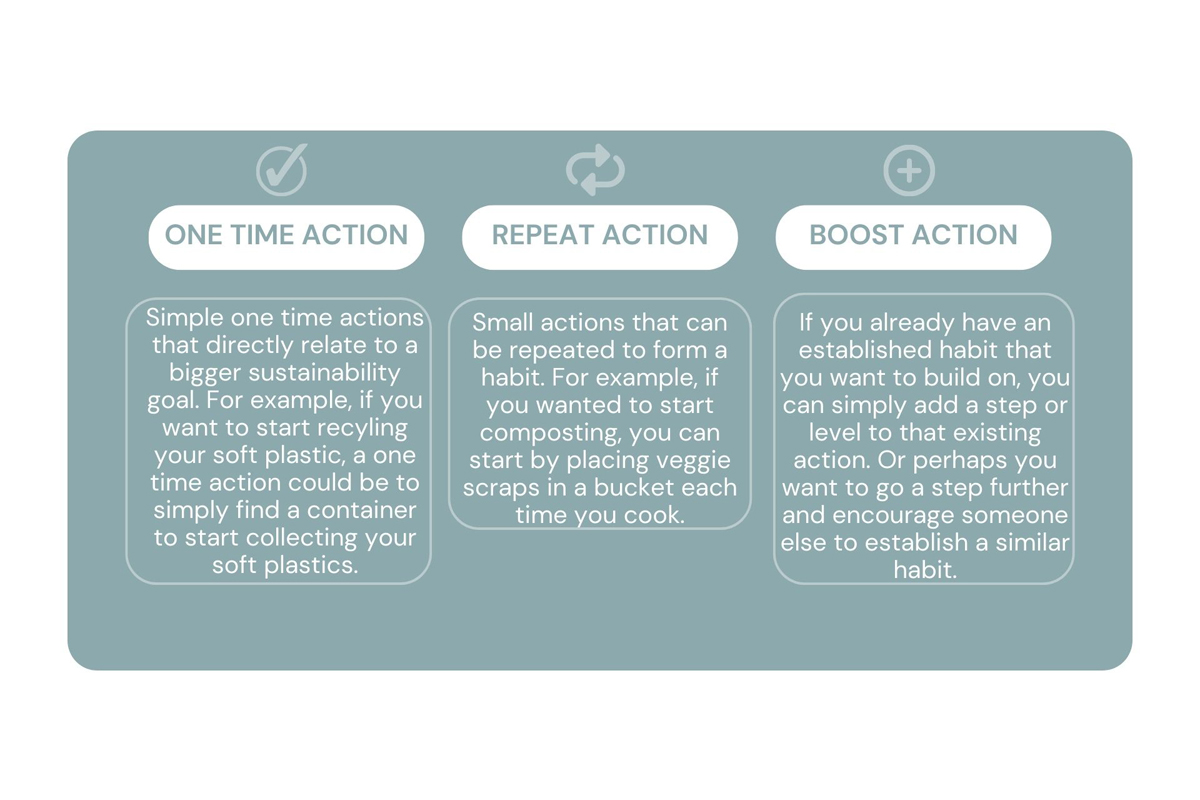
Top 3 learnings
Related finalists
Creating Impact/Winners
Creating Impact/Winners
Creating Impact/Winners
Creating Impact/Winners
Creating Impact/Winners
Creating Impact/Winners
Creating Impact
Creating Impact
Other finalists
Climate Action
Climate Action
Sustainability Champion – Staff/Winners
Sustainability Champion – Staff/Winners
Student Engagement
Student Engagement
Creating Impact
Creating Impact
Sustainability Champion – Staff/Winners
Sustainability Champion – Staff/Winners
Sustainability Champion – Student
Sustainability Champion – Student
Top 3 learnings
Creating Impact category
The Sustainability Challenges are online, self-paced, action-based, co-curricular programs designed to both educate participants in major sustainability issues and to establish long-term behavioural change through small habit building. Since 2020, 435 students have completed the Challenges, which include roughly 5 hours of learning and 10 days to demonstrate, practice and consolidate their new sustainable habits. Each Challenge teaches participants about the UN SDG’s and sustainability issues, before breaking down bigger sustainability goals into bite-size habits they can easily adopt into their daily lives, using the habit formation psychology of Dr B.J. Fogg.
The Origin Story
The Challenges were developed with no additional funding or resourcing by a Global Leadership Program (GLP)* staff member during the COVID-19 lockdowns of 2020 in order to, at least initially, fulfil a need to create online opportunities for students. As the first Challenge came together, however, we realised the potential impact this type of learning could have due to these key characteristics:
- Free to participate
- Assessment free
- Easily scalable
- Unbound by curriculum/course limitations
- Use of a variety of media to engage Gen Z students
The Challenges
Two Challenges have been developed, one focussing on Waste and the other on Carbon Emissions. The Challenges take participants on a 5-step journey:
- Knowledge: Little base knowledge is assumed and participants are presented with information from a variety of both media types and information sources, all of which is open source and from trusted organisations such as the Climate Council, the ABC, and local NGO’s such as WornUp and OzHarvest. They offer basic explainers, case studies and even a personalised motivational message from staff-favourite Costa Georgiadis. “The content and resources supplied were easy to read and understand. The quiz questions and activities were also easy to understand, and were good as they made me think more deeply about how the content relates to my actions, and how I can implement the practical tips provided into my daily life.”
- Motivation: In order to complete the challenge, students must actively participate in either 4 or 5 challenges (depending on the focus of the challenge), see Table 1: The Challenge Design. “They were easy to understand and to be put into almost instant action which allowed for change almost simultaneously.”
- Small action: Doing a quick google search of “sustainable actions you can take today” can leave you totally overwhelmed with answers like “start composting!” or “use your local earn and return!”. But, how do you actually start a compost pile? How do you use earn and return? Our challenges intentionally breakdown these common “tips” into micro actions. Our first option is a “one time” action. Want to be composter? Start by finding a container in your kitchen to put scraps in. Want to use earn and return? Go to the website and check where the closest facility is, or download the earn and return app. These are examples of one time actions. For those more advanced students, their challenge may be to start putting their banana peels in their benchtop container everyday, or to put their recyclable containers in a box, ready for earn and return on the weekend. We call these “repeat” actions. Our final category are “boost” actions. This is where to take a sustainable habit you already have to the next level. A participant might show their flatmates how to use the benchtop compost container, or promote their use of earn and return on their Instagram account. “I liked how the program introduced me to things that I had never thought of previously and showed how by changing my own habits I can create a positive impact.”
- Celebration and community: The celebration of the completed action takes place in ‘Padlets’. Each individual challenge (see Table 1) within the modules has an interactive Padlet board, where students are asked to share their actions. This step is critical in generating a sense of community and shared achievement, while inspiring and informing their peers with their own ideas and actions. “I liked how there was a ‘community’ aspect of it, where we can see other students’ responses to prompts. It was nice being able to look at other people’s aims and targets because it helps with setting your own goals with sustainability.”
- Positive impact: Participants create new long-term habits with positive environmental and social benefits. “After completing the GLP Sustainability Challenge, I have worked on my current habits and acknowledged the importance of taking care of the environment, particularly at home.”
| Sustainability Challenge: Waste (SC-W) | Sustainability Challenge: Carbon (SC-C) |
| UN SDG introduction | UN SDG introduction |
| What’s the problem with waste? | What’s the problem with carbon emissions? |
| Circular economy | Carbon offsetting |
| Challenge 1: Waste avoidance | Challenge 1: Energy |
| Challenge 2: Food waste | Challenge 2: Transport |
| Challenge 3: Reuse | Challenge 3: Fashion |
| Challenge 4: E-waste | Challenge 4: Fashion |
| Challenge 5: Recycling | Final pledge |
| Final pledge |
* The Global Leadership Program (GLP) which is a free, co-curricular global citizenship education program open to all students at Macquarie University with approximately 3000 currently enrolled students. Students are motivated by a points system to participate in a variety of activities.

Environmental and social benefits
Environmental outcomes
The Challenges have, to date, informed 435 students about sustainability and have created lasting behavioural change through the adoption of small habits related to waste and carbon emissions. In a follow up survey of past participants 88% of respondents confirmed that, as a direct result of their participation in the Challenges, they have established new habits, including recycling; growing food; opting for online resources instead of textbooks; composting; ethical purchasing; shorter showers; renewable energy use; using reusable products; walking instead of driving; and eating less meat. The environmental impact is clear: our Challenges created sustained behaviour shifts in the lives of hundreds of students.
“I separate my soft plastics now and have bought way less plastic bags from the supermarket. I have a giant bag of both the cardboard and tote bags in the back of my car that I keep near the door and take to my car every time I go out. I’ve also made sure to only by produce out of plastic packaging when I’m able to. I’ve gotten a lot better at planning meals and not only that but using the leftovers in my fridge and freezer.”
“I finally recycled all my old electronics lying around my house at a recycling centre, I started a compost bin, I started recycling my cans and bottles and started my own vegetable garden which now has cherry tomatoes, kale, lettuce and herbs!”
Social outcomes
The social outcomes of the Challenges were carefully considered and are three-fold:
- The use of Padlets allowed students to engage with each others content/actions in order to build connection and comradery between participants (including staff!). “Was also great seeing comments from all the other students to feel we are all connected and working towards sustainability together!”
- 64% of participants have knowingly influenced or inspired others with their new habits or learnings, including family, friends, housemates and landlords.
- Participants have noted that, as result of the Challenge, they feel more confident discussing environmental issues and encouraging/convincing others to make environmentally conscious decisions.
“I encourage my close friends and family to recycle and often talk about ways they can reduce the use of heaters\AC bringing down their energy consumption. I also got my landlord to start doing the bottle deposit collection so those hard plastics can be properly recycled.”
“I began composting my whole family (who I live with) are joining in too! This has also been wonderful for our garden.”
Operational outcomes
Staff involvement in the challenge brought sustainability to the forefront of our programming and in 2023 resulted in the introduction of ‘social and environmental sustainability’ as one of four formal program values. This shift in program values reflects a long-term commitment to incorporating sustainability as a fundamental principle in all that we do.
Leadership and engagement
Prior to participating, students have reported feeling incapable of habit change and simultaneously daunted by the SDG targets. Icons of sustainability like Greta Thunberg or The Rogue Ginger are idealised, but their actions seem irreplicable in everyday life. What is distinct about our Challenges is that not only do they encourage the small wins, they celebrate them! This incorporation of behavioural psychology has allowed participants (students and staff) to feel lifestyle change is attainable. The Challenges also highly personalised to a participant’s own life and unique circumstances, allowing them to explore their own behaviours and choices in an assessment-free environment. We’ve been proud to achieve these through our highly scalable, highly accessible, replicable and low-cost model.
“I liked how … for every challenge it had what UN goals it contributed towards which was a good link and made it seem like I could achieve the goals individually.”
“(The challenge)… covered a good range of areas in which people can change and really made me think about the things I do on a daily basis that impact the environment, and I realised I was actually quite environmentally friendly when we often feel that we aren’t making a difference.”
“I feel like there was an abundance of information which was relevant to us as individuals at a university level in terms of what we can do to help reduce our waste which I really appreciated. The practical suggestions and answers given are extremely helpful and can be implemented at varying levels depending on capacity and ability of the individual.”
Significance to the sector
Our Challenges (from the research we’ve undertaken), appear to have a unique set of attributes that when combined together, makes them distinct to the higher education sector in Australia:
- They can be run in and out of regular academic timetabling
- There is no grading
- Participants come from a large variety of disciplines to share ideas
- Participants include undergraduate, postgraduate and study abroad and exchange students, both on and offshore
- They are replicable and scalable in any institution through an online learning platform
- They demonstrate the value of learning outside of a set discipline
- They combine knowledge gain and the application of the knowledge into action
- They are free of cost to participants!
Wider societal impact
The impact and value of our Challenges can be seen in tangible outcomes related to SDGs 12 and 13 with actual and ongoing reductions in both waste and carbon emissions by participants who truly believe in their own capacity to change. As previously mentioned, over 64% of participants believe they’ve changed the actions of others, demonstrating the butterfly effect we had hoped for.
Participant feedback demonstrates a belief in the impacts of individual actions and their ability, through modelling and advocacy, to affect change in a variety of contexts including their homes, social circles and workplaces.
“I really liked setting challenges for myself and seeing all the other great challenges that everyone else set by reading everyone’s posts on the Padlet. I also really liked using the ABC Carbon Counter to see just how much CO2 I would be saving by making small lifestyle changes, it was really motivating and helped put things into perspective.”
“I liked that the activities that they had us try weren’t too difficult to implement and continue in our daily lives.”
“I felt very moved after completing this unit, and I shared all this new knowledge with my friend group and bought reusable shopping bags for everyone. My partner and I also bought our own pack of travel cutleries that we use instead of using plastic forks and knives when we eat out. My friend, later on, decided to complete the GLP sustainability unit after hearing about my experience with it.”
Learner/Graduate employer impact
No matter the sector or industry in which a graduate seeks employment, a working knowledge of the UNSDGs and key sustainability issues such as carbon emission and waste is a potential opportunity for employers both domestically and abroad. Research has shown that having staff with foundational sustainability knowledge can have positive impacts on procurement practices, reduction in office waste, improved employee well-being and enhanced brand reputation, amongst other benefits. More broadly, the Challenges relate directly to our wider program outcomes of ethical reasoning, self-management and critical thinking, all of which are tested and strengthened throughout the Challenges.
“I liked how it showed us some more nitty gritty details of sustainability and made me go “huh…I didn’t think far enough on that particular topic” or “huh, that wasn’t expected”.”
“I liked how the program introduced me to things that I had never thought of previously and showed how by changing my own habits I can create a positive impact.”

Related finalists
Creating Impact/Winners
Creating Impact/Winners
Creating Impact/Winners
Creating Impact/Winners
Creating Impact/Winners
Creating Impact/Winners
Creating Impact
Creating Impact
Other finalists
Climate Action


Driving Towards Tomorrow’s Campus with Vehicle-to-Grid EV Technology
As part of Flinders University’s drive to innovate and become a leader in climate action, the University launched its Vehicle-to-Grid (V2G) initiative. This involved installing and maintaining 20x V2G and smart chargers for its growing electric vehicle fleet. Leveraging 100% renewable energy generated by ENGIE’s Willogoleche Wind Farm and Flinders University’s solar power systems, this enables the storage of renewable energy in EV batteries to be discharged on campus during peak demand periods. Hence, allows for these EV fleets to operate as a Virtual Power Plant (VPP) to deliver peak demand management and optimization of behind-the-meter generation.
Overall, this initiative demonstrates the reliability and scalability of bi-directional and uni-directional smart-charging systems for EVs in reducing GHG emissions while facilitating teaching, research, and innovation opportunities. Moreover, it exemplifies a sustainable and innovative solution to scale energy storage technology and increase renewables.
Sustainability Champion – Staff/Winners

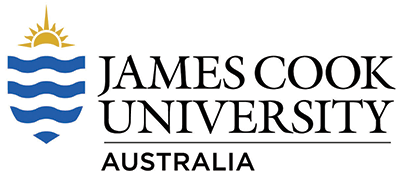
Brandan Espe
Environmental Officer / Acting Grounds Supervisor
Brandan has brought over 50 federally listed Endangered species of plant into the James Cook University living collection, many of which have never been cultivated and are found in no other collection in the world.
Of these, over half have been sustainably wild collected, inclusive of field and clone data, so they can be used for ongoing conservation, research and teaching, the remaining being sourced from private and partner organisations through favours of service or trades.
He personally funded the project from 2019-2022, until funding was awarded for the program due to its success, with the program now being engrained into the Universities landscapes for ongoing management should he leave JCU, creating a threatened species legacy collection.
The program has now expanded beyond this, with an additional 48 species now funded for further addition, some of which are only known from less than 5 sightings in history.
Student Engagement


Sustainability Leaders creating real impact!
La Trobe created a unique Sustainability Leaders volunteering program to increase engagement with students on campus and empower them to act against waste and promote sustainability. It included the following initiatives:
- Promoting the reusable crockery implementation,
- Increasing knowledge action of other students on campus to diversion comingled recycling and organic waste from landfill.
- Focus on waste audits and data,
- Improved signage through new waste posters for students living on campus.
- Collaboration with Cirka (our cleaning and waste partner) to create a waste wall and;
- Learning all things sustainability (net zero, biodiversity, waste, reusables, engagement)
These initiatives yielded significant results and with a reduction in waste contamination by almost 40% at the residential buildings and engagement with over 80 groups of people for the Reusable Revolution.
Creating Impact


Where knowledge meets habits: Empowering students for a sustainable tomorrow
Our online Sustainability Challenges offer participants an engaging, self-paced learning experience centered around a specific United Nations Sustainable Development Goal (UNSDG). Requiring minimal resourcing and at zero-cost to participants, we’ve created replicable, compact, scalable, and impactful learning opportunities that result in real impact.
The Challenges follow a structured process that moves participants from knowledge gain to simple action to celebration, to establish small but mighty habits relating to waste and carbon emissions. This approach recognises that knowledge alone is often insufficient to drive behaviour change, and that ease of action and celebration are crucial components in creating sustainable habits.
Sustainability Champion – Staff/Winners

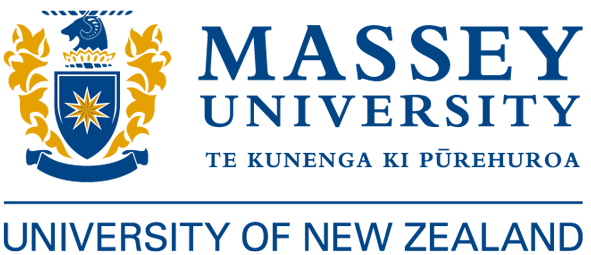
Catherine (CeeJay) Donovan
Veterinary nurse – Anaesthesia
From establishing the Massey Vet School Green Team to leading impactful initiatives, my commitment to environmental sustainability has been making waves. With the help of my team, I have accomplished numerous small, yet meaningful actions, including integrating a sustainability lecture for final year vet students and implementing battery recycling alongside rechargeable battery use. Our larger projects encompass the introduction of green waste and soft plastics recycling bins, an energy audit resulting in power-saving measures, and playing a part in a successful rubbish audit. I spearheaded the ‘6 in 6’ campaign, empowering individuals with six simple steps for workplace sustainability. Through the SustainaVet social media pages I help to educate and inspire peers nationwide. As the Massey School of Veterinary Science sustainability champion, I had the privilege of speaking at the annual veterinary conference on sustainability in clinical practice. Currently I’m conducting pioneering research on responsible cat waste disposal. Together, we’re forging a greener future, one initiative at a time.
Sustainability Champion – Student


Louis Walmsley
SDG Coordinator Monash Association of Sustainability, Office Bearer Monash Student Association’s Environmental and Social Justice Department, Masters of Environment and Sustainability Student
Louis is an exceptional student sustainability leader at Monash University. His passion and dedication to sustainability have made a significant impact on the community. Louis’s values revolve around sustainability, which is evident upon meeting him. He actively participates in various sustainability groups, demonstrating his commitment to creating a more environmentally conscious society.
One of Louis’s notable involvements is with Precious Plastic Monash, where he organizes remarkable events and fosters collaboration among like-minded individuals, student groups, and staff. His contributions to the Monash Association of Sustainability have allowed him to conduct valuable research on plastic usage and climate action, resulting in positive changes within the university.
Through his work with the Monash Student Association, Louis has engaged hundreds of students in fun and interactive sustainability initiatives. He took the initiative to organize a sustainability food fair, which was one of the largest sustainability-related events held at Monash post-COVID. This accomplishment is a true testament to Louis’s hard work and creativity.
Louis is an outstanding student leader whose efforts in sustainability have had a lasting impact on Monash University and its community. His inspiring nature resonates with everyone who knows him.

